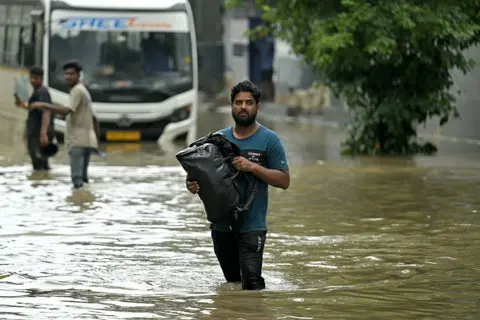Bengaluru: India’s Silicon Valley Faces Challenges Amid Torrential Rains
Bengaluru, often hailed as India’s Silicon Valley, has long been a beacon for technology, innovation, and fast-paced growth. Yet, recent events have highlighted how even the most advanced cities are not immune to natural challenges and infrastructure woes. In this article, we explore how Bengaluru faces the realities of heavy rains, flooding, and mounting pressure on its urban systems—and what this means for its future as a global tech powerhouse.

The Deluge: Rainfall Puts Bengaluru’s Silicon Valley Status to the Test
In May 2025, unusual pre-monsoon showers swept across Bengaluru. Large parts of the city—home to global tech companies and startups—were inundated. According to a BBC News report, more than 100mm of rain fell, submerging roads, damaging homes, and halting daily life. The city—often referred to as the Silicon Valley of India—suffered rare disruption, with many companies asking employees to work remotely due to impassable roads.
More worryingly, the heavy rainfall proved fatal. Three lives were lost, and hundreds faced property damage. Residents waded through knee-deep water, and entire IT corridors faced severe flooding. Experts identified poor urban planning, rapid construction over lakes and wetlands, and a lack of coherent infrastructure management as key reasons behind the crisis.
Infrastructure Under Scrutiny: Can Bengaluru Keep Up?
Despite its reputation as the backbone of India’s tech industry, Bengaluru has struggled with core urban issues. As captured in a Times of India feature, over 500 homes were flooded, and the city braced for more days of relentless rainfall. The scale of disruption raised urgent questions about the city’s readiness to tackle recurring environmental events.
The contrast between Bengaluru’s global tech achievements and its civic shortcomings drew attention across India. A Zerodha-backed investor, Dilip Kumar, voiced widespread frustration on social media about how a city leading in artificial intelligence and innovation could not manage something as fundamental as urban drainage. Read more on NDTV about the infrastructure debate. Many agreed that short-term fixes would not solve deep-rooted urban issues.
Voices from the City: Calling for Change in India’s Silicon Valley
Civic leaders, corporate representatives, and ordinary citizens are now demanding sustainable, long-term solutions to Bengaluru’s urban planning woes. Experts stress that respecting environmental limits and improving government accountability are crucial to safeguarding the city. There is consensus that if Bengaluru is to retain its title as the Silicon Valley of India, urgent action on urban infrastructure must follow its advances in technology.
Conclusion: Building a Resilient Tech Hub for the Future
Bengaluru’s recent challenges are a stark reminder that true innovation for any Silicon Valley includes smart urban development and climate readiness. As the city rebuilds, addressing its infrastructure deficits is vital for keeping its talent, businesses, and aspirations thriving amid change. The world will watch to see if India’s Silicon Valley can turn its vulnerabilities into an opportunity for sustainable progress.